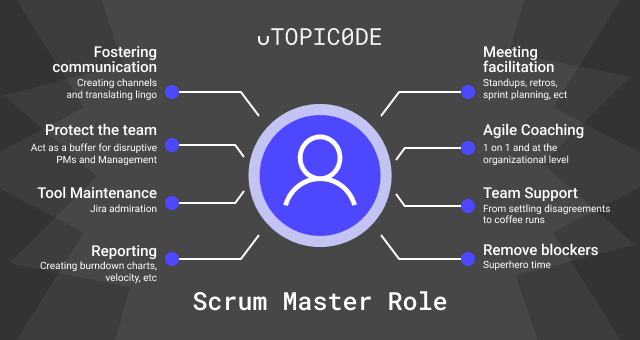As Agile methodologies continue to gain popularity in the tech industry, the role of the Scrum Master has become crucial for successful project management.
But what exactly does a Scrum Master do, and what key skills should you look for when hiring for this role? In this article, we’ll unpack the Scrum Master role and provide a helpful guide for tech companies, recruiters, CEOs, and CTOs to make informed hiring decisions.
- Communication Skills: Effective communication is key to success as a Scrum Master. They must be able to clearly articulate project goals, facilitate communication between team members, and resolve conflicts.
- Leadership Skills: The Scrum Master is a servant-leader, responsible for inspiring and motivating the team to achieve their goals. They must provide guidance and support when needed.
- Organizational Skills: A Scrum Master must be highly organized to keep the project on track. They must ensure that the team is following the Scrum framework and that all meetings are scheduled and run efficiently.
- Technical Knowledge: While not always necessary, having technical knowledge is a plus for a Scrum Master. They must be able to understand the technical aspects of the project and communicate effectively with the development team.
- Problem-Solving Skills: The Scrum Master must be a problem-solver, able to identify issues before they become roadblocks to the project’s success. They must also be able to work with the team to find solutions to any problems that arise.
- Flexibility: Agile projects are by nature flexible, and the Scrum Master must be able to adapt to changing requirements and priorities. They must also be able to pivot quickly when necessary and ensure that the team is aligned with any changes.
Best Practices for Evaluating Candidates
When evaluating candidates for the Scrum Master role, it’s important to assess their skills in each of the areas listed above. Consider asking them about their experience with the Scrum framework, their ability to work in an agile environment, and their approach to problem-solving.
It’s also important to evaluate a candidate’s soft skills, such as their ability to communicate effectively, their leadership style, and their organizational skills. Ask behavioral questions to gain insight into how they handle challenging situations and work with others.
Debunking Misconceptions
Finally, it’s important to debunk common misconceptions about the Scrum Master role. For example, the Scrum Master is not a project manager, but rather a facilitator who helps the team to achieve their goals. Additionally, the Scrum Master is not solely responsible for the success of the project, but rather works with the entire team to ensure success.
In conclusion, the Scrum Master role is critical for successful Agile project management in tech companies. By understanding the responsibilities, essential skills, benefits, and best practices for hiring a Scrum Master, you can make informed decisions and build high-performing tech teams. So, gear up and unlock the full potential of Agile with a skilled Scrum Master at the helm!

